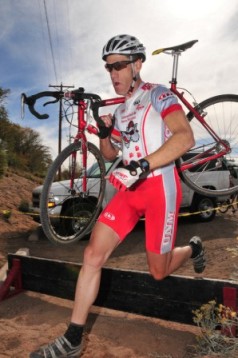
photo courtesy of Jeff Freeman
I wrote a "nutrition" response to a client in late 2008 that I thought was
pretty good, finally put on paper some stuff I (and others, long before me)
have been saying for years. I sent it out to the JBV Coaching client list at the time, and it found its way to some other training sites, blogs, etc. Someone reminded me of it the other day, so I'm finally putting it up on the website as an article.
Here is the original client question: "
I haven't had a scale since I moved, so I wasn't really
monitoring with any regularity for awhile, which I thought could be a good
thing. BUT, now most of the clothes I've worn for the last few years aren't
fitting so well. It's definitely not my imagination. It's just too many days
of saying "this won't matter" with sweets and alcohol. I've realized lately
that whether or not I ride a lot or not at all I tend to eat a similar
amount, so I think that's part of the problem. Otherwise, yeah, I probably
do have some bad habits. I guess I know what/when you're supposed to eat as
a cyclist, but that gets screwy sometimes because I just don't feel hungry
when it seems I should, which usually leads to eating too much too late in
the day."
<<<<<<<<<<<<<<<<<<<<<<<<<<<<<<<<<<<<<<<<<<<<<<<<<<<<<<<<
Here's the response I wrote:
Appetite is often suppressed after hard efforts, and also as fatigue builds
over days/weeks of consistent training. That's when it's most important to
objectively, logically remind yourself that eating after training and
pre-fueling before training ARE PART OF YOUR TRAINING. It's sort of the same
thing as going out for 3-4 hours on a cold, windy day, when you're already
tired and don't really feel like it - it's not easy, it's just something you
do because you know it's correct. What tends to happen is, if you're good
and vigilant about the pre-fueling for rides, and then also the post-workout "recovery" nutrition, you tend to have fewer cravings and lower appetite on
the days you don't train.
As a way to get a two-fer, sometimes when you don't feel like eating but
know you need to, it's a great time to find the most appetizing thing you
can find. Greasy omelets, hashbrowns, pancake breakfasts, waffles, cinnamon
rolls, muffins, cookies, pie...those are often a good way to get 500 - 1000
calories before a big ride, or as your "meal" within a couple hours of
ending a big ride (assuming recovery drink within 30 minutes of the end of
the ride). What's nice there is you're giving your body the calories it
needs (and those are two times when the "type" of calories is less important
than just getting them), and you're *also* having the treat that you might
have been craving on a non-training day. Days/periods like this are where
you use the scale to say "crap, I've got to go get some baked goods or I
won't be able to train tomorrow!"
For me it's Counter Culture cinnamon rolls [ed. - Counter Culture is a Santa
Fe restaurant that makes the best baked goods in town], pie...pumpkin bread,
baked goods. When you eat these treats when the furnace is hot or needs
stoking, then it's easier to eat only "good" foods on the days you're not
training, or are trying to limit calories. "Bad" foods ("comfort" foods?)
tend to be
calorically dense, which is good when appetite is suppressed and you really
just need the calories. "Good" foods (whole grains, legumes, fruits,
veggies,
etc) tend to be less calorically dense, but more vitamin/mineral dense, and
also higher in fiber. That means you can eat more volume (to fill up)
without going over your caloric needs/usage for the day, and you're
still getting the micro-nutrients you need.
For years when I was younger, because I was big and couldn't climb, I would
always think it was a great idea to not eat when I wasn't hungry. So when my
appetite would disappear 2-3 days into a stage race, I'd stop eating after
stages. The results, predictably, were:
1. I'd really suffer the last few days of stage races, or be unable to
complete longer training blocks.
2. I'd wind up binging on crap on days I wasn't training, and/or at night.
3. My weight would fluctuate within a 5-6lb window, but I never really got
leaner or faster. I mean, I was at 5-6% bodyfat anyway, but I wasn't
providing my body with the fuel it needed when it needed it, and my overall
health and
performance suffered as a result.
I think many bike racers intellectually know what to eat and when,
but they wind up in the same trap I was in for probably 10-15 years. It's a
vicious cycle, and it's hard to get out of.
One way to look at it is from a positivist perspective. I sometimes coach
cyclocross pacing as "find the places you can recover first, then the places
you can/need to go hard become more obvious, and you're better able to put
out lots of power there." Look at nutrition the same way, pick out the days
you can/should get mega-calories before & after your ride, and then you're
making it easier to "be good" on the days you want to limit calories.
Instead of being punitive to yourself when you're "bad", you're being nice
to yourself (treats!) when it's a useful thing.
Of course there are details to manage, you've got to have access to treats
on the training days, and (harder for many people) you've got to have "good"
food available on days you're being "good". Probably best not to look at it
as "good" or "bad", maybe better to say "fueling/rewarding" days, and "run
lean", "limiting", or even "cleansing" days.
.
© JBV Coaching 2008